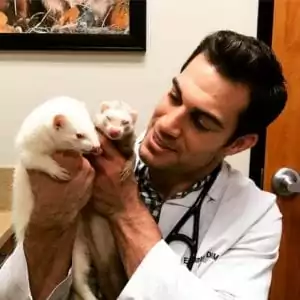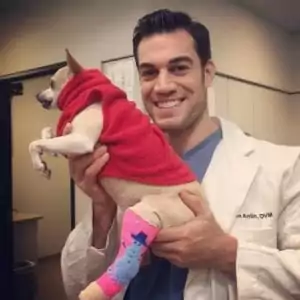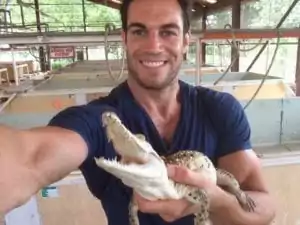Dr. Evan Antin is well known in the social media, but we bet there are some details about him you don’t know! Read on and find out more about this amazing vet!
-
Tell us about yourself
-My name is Evan Antin and I’m a small animal, exotics, and wildlife vet. I practice at Conejo Valley Veterinary Hospital in Thousand Oaks, California, near Los Angeles. I’m 32 years old and I’m originally from Kansas. I’m passionate about weightlifting/fitness and traveling. I’ve been to over 30 countries over the last 10 years and my favorite place to spend time and connect with nature and myself is in the jungle.
-
Why did you decide to become a vet?
-I’ve always known I wanted to work with animals and in college I gained a real appreciation for medicine and surgery and knew becoming a veterinarian was my calling.
-
Where did you study?
-I studied Ecological and Evolutionary Biology at the University of Colorado at Boulder and went to Veterinary School at Colorado State University (CSU). CSU is an extremely competitive veterinary program and I am extremely thankful for my education from there. I also loved living in Colorado, it’s beautiful!
-
What does your veterinary work include?
-As a general practitioner I see patients of many different species everyday from dogs & cats to exotic pets to California native wildlife and some zoo animals on occasion. I also love to travel and volunteer at wildlife rescues and work with wild animals around the world including Central and South America, Southeast Asia, and Africa.
-
We see a lot of interesting pictures from your exotic patients. Can you tell us more about the ones you found the most interesting and the most challenging?
-I love working with exotics and it was Reptiles that initially attracted me to working with animals. I love working with big monitor lizards and tortoises as well as wildlife like coyotes and bobcats. Wildlife can be very challenging to work on as these animals are not tame and almost always require anesthesia just to be able to look at them let alone if any procedures are necessary.
-
You work with exotic animals, we noticed some you got some injuries on the job. How dangerous is to work with exotic animals and what is the worst thing that happened to you?
-Working with any animal can be dangerous and exotics is no exception. I’ve been bitten by many species including dogs, crocodiles, snakes, mice, monkeys, you name it, lol. Bites can be dangerous of course and it’s the infections from bites you really have to worry about with some species like certain reptiles that have very dirty mouths. The worst bite I got was probably from a 5-6′ Nile Crocodile. She opened up my arm but it healed fine and no permanent injuries. To be honest, large animal vets working with cattle and horses have much more to be worried about-those vets can get kicked in the head by an animal that weighs over 1000 lbs! And wildlife vets doing field work with large wild animals also have a lot of risks. I did some work with wild hoovestock and Rhinos recently in South Africa and the inherent dangers are definitely there, lol!
-
Tell us more about your YouTube channel or any other project you do at the moment?
-My YouTube channel is up and coming and designed to be a platform for me to educate viewers on different topics of veterinary medicine and wildlife and conservation.
-
Do you have any advice for the future vets?
-My best advice for future vets is to get great grades in school and spend time volunteering with veterinarians and people in the animal profession. It’s a long road but follow your heart, work hard, make sacrifices and remember there’s a light at the end of the tunnel. I go into more detail about all this in my YouTube video “You Can Be a Vet!” Please view that video if you’d like to know more about my recommendations and my background as a veterinarian.
-
What are your goals for the future?



